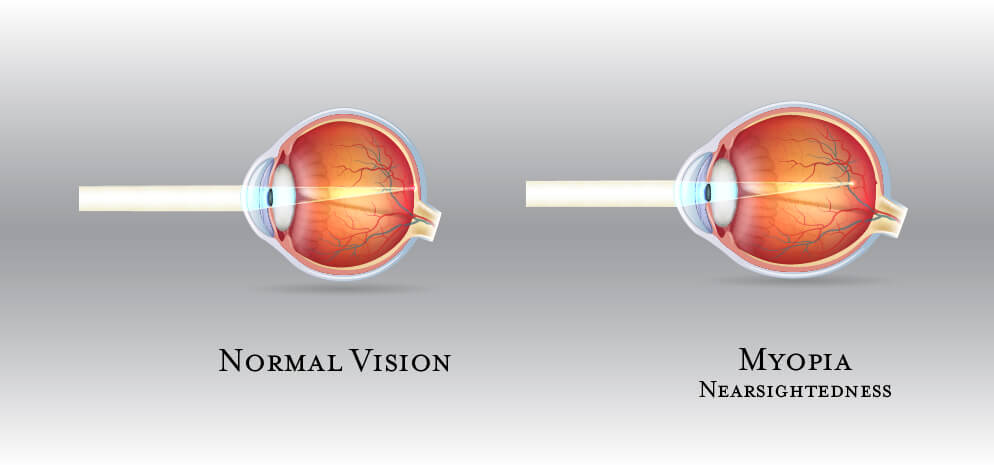Nearsightedness
Nearsightedness (also called myopia) is the most common form of vision impairment in people under the age of 40. In fact, it’s estimated that by the year 2025, roughly 50% of the world’s population will be nearsighted.

What Are Symptoms Of Nearsightedness?
A person who is nearsighted has difficulty seeing things at a distance clearly but is generally able to see well for close-up tasks or reading. In addition to blurry distance vision, other symptoms include squinting, eye strain, and mild to moderate headaches.
If you experience any of these symptoms while wearing your glasses or contacts, it may be time to schedule an eye exam with an Optometrist at EyeCare Optical at one of our six East Tennessee locations.
What Causes Nearsightedness?
Nearsightedness occurs if the eyeball is too long or the cornea is too curved. As a result, the light entering the eye is focused at a point in front of the retina rather than on its surface, causing distant objects to look blurred. The condition typically begins in childhood and stabilizes in early adulthood. However, sometimes it can progress with age.
How Is Nearsightedness Treated?
Most nearsighted people have good results with glasses or contact lenses. Depending on the degree of the nearsightedness, correction may need to be worn all the time or just when clearer distance vision is needed, like while driving or watching a movie. If you are nearsighted, the first number on your prescription will be preceded by a minus symbol (-). The more nearsighted you are, the higher the number.
Another popular treatment for nearsightedness is refractive surgery, which can reduce or eliminate the need for glasses or contacts. There are two effective forms of this procedure – PRK and LASIK.
PRK involves using a laser to remove a layer of the cornea, which reshapes it to allow light to focus more accurately onto the retina. LASIK is the more common type of refractive surgery. This procedure involves a thin flap being created on the surface of the cornea while a laser removes a precise amount of corneal tissue to reshape the eye. The flap is then returned to its original position, instantly sealing itself. The result is often greatly improved vision.
For people who have a high degree of nearsightedness or thinner-than-normal corneas, refractive surgery may not be the best option. In that case, there is also the option of surgically implanted lenses called phakic IOLs. These work like contacts, except they are typically permanent with no maintenance needed.
Can nearsightedness affect the health of my eyes?
While nearsightedness can become slightly worse as we age, it’s very rarely progressive and serious. In most cases, nearsightedness is simply considered a minor inconvenience that just requires glasses or contacts for clear vision.
In relatively rare cases, however, nearsightedness can escalate and be severe enough that it’s classified at degenerative myopia (also called malignant or pathological myopia). About 2 percent of people in the United States are afflicted with this condition, and it’s believed to be hereditary as it typically begins in early childhood.
People with this condition experience rapid elongation of the eyeball, which leads to quick and drastic loss of vision. Sufferers also have significantly higher risk of retinal detachment or bleeding in the back of the eye due to abnormal growth of blood vessels. Degenerative myopia may also increase the risk of developing cataracts.
If you suspect you or a loved one may have degenerative myopia, it’s important to schedule an appointment with an eye doctor as soon as possible.
People Over The Age Of 50 Should See An Eye Care Professional Every Year.
Regardless of the severity of your nearsightedness, we’d love the opportunity to help you achieve the best vision possible. Schedule your appointment with us today by calling (865) 584-0905. Our board-certified Optometrists at EyeCare Optical are standing by, ready to offer personal care and state-of-the-art technology with convenient offices in Knoxville, Farragut, Hardin Valley, Maryville, Oak Ridge and Sevierville.


